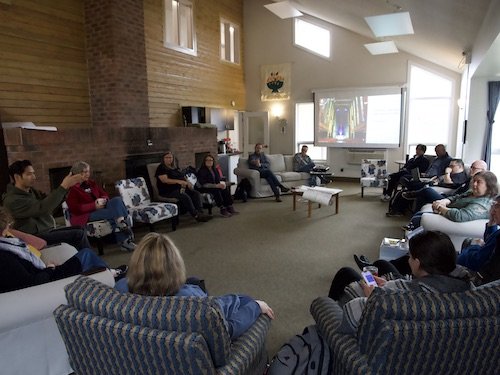The Canadian Learning Community for Decolonization and Innovation in Theological Education (or CLC) has been relating, stretching and growing together for two years now.
NAIITS: An Indigenous Learning Community is the lead partner in this collaboration supported by the Lilly Foundation's Pathways for Tomorrow initiative. Together with our partners and friends at Acadia Divinity College, Tyndale Seminary and Ambrose Seminary, we are reimagining theological education as a Spirit-led effort to create communities of faith that reflect Jesus’ heart for transformative love and justice.
One of the key goals of the CLC is for the community to engage with the Calls to Action of the Truth and Reconciliation Commission of Canada (TRC) as a framework for the asset-based work we do.
We have been engaging partners in conversations on Calls 48, 49 and 60 this past year. Calls 48 and 49 focus on adopting the United Nations Declaration on the Rights of Indigenous Peoples (UNDRIP) and repudiating the Doctrine of Discovery. In Call to Action 60, the TRC challenges churches and seminaries to collaborate with Indigenous spiritual leaders to teach honestly about the legacy of religious conflict and spiritual violence connected to the residential schools. While these conversations have been challenging, they have also been sacred and the launching point for dreaming how each partner organization might continue the work of decolonization in this supportive community.
The CLC had a community gathering in the last academic year that had some life-giving and transformative moments. Lori Ransom, the former senior advisor for church relations to the TRC, joined us for an insider’s perspective on the TRC’s use of the language of spiritual violence in Call to Action 60.
Lori’s rich and powerful presentation was followed by a reflection from NAIITS Elder Liaison Adrian Jacobs. Adrian referred to CLC’s working and evolving definition of decolonization as right relationships and agreed that right relationship is important, but it can only be a right relationship if it leads to systematic change and dismantling of the structures that have allowed abuses of power. This was a sacred and convicting moment for many of us in the room that day. As we closed that gathering with smudge circle, we felt connected through our experience of sharing knowledge and our commitment to continuing this difficult and sacred work together.
We know that the work ahead is long — and well beyond the term of this grant. So it's important that a community of activists, academics, administrators, front-line practitioners and pastors are being drawn together as friends and co-conspirators for what the late Murray Sinclair often called the "generational work of reconciliation."
In the coming season, there are exciting new pieces of CLC work in which we’ll be experimenting and refining ideas for the systemic change that Adrian challenged us to pursue. This good work will help the partner schools to take up parts of their TRC responsibilities, and we trust that it will extend the sacred beauty of the learning community.
While this work can be difficult, it is also beautiful and sacred. We are a community of regular people dedicated to learning, growing and dreaming together to create space for a different way of being in our spaces. We are two years into this collaborative adventure, and there is still so much to do. We look forward to sharing more pieces of our journey in the coming months.
— Nichole Forbes and Mike Hogeterp, CLC Facilitation Team
